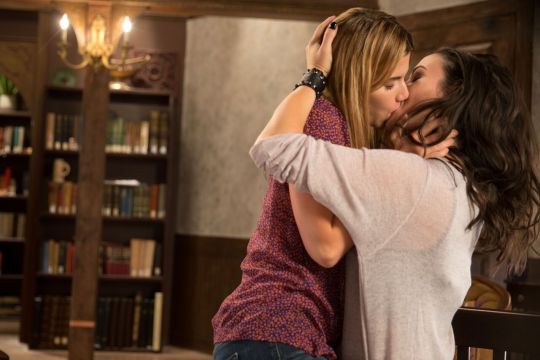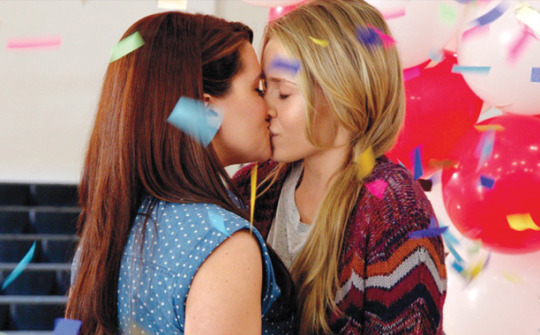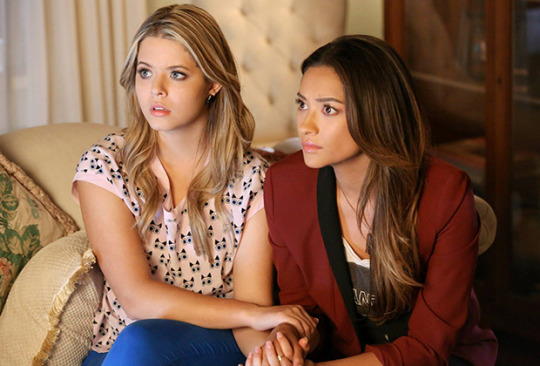#i mean i do wish that sanvers had been endgame
Photo








favorite wlw ships appreciation post
#elhani#quinntana#hollstein#emison#karmy#choni#sanvers#mulan x aurora#sapphic#lesbian#bisexual#i'm....genuinely impressed that all these ships were either canon or one sided canon#or in the case of quinntana they hooked up even if there were no feelings#also 6/8 of these are interracial which is /very/ impressive#damn sapphic representation really has come a long way from shipping two characters who were 'just friends' in canon huh#i mean i do wish that sanvers had been endgame#and emison hadn't gotten divorced#and karmy had gotten to date#but our rep is miles better than it used to be!!#and that makes me proud#lgbt rel
442 notes
·
View notes
Text
Supergirl, the Bechdel Test, and Critiques of Critiques
Because asks–ranging from fans who have been made to feel guilty for not liking the current season of Supergirl, though many are still watching and hoping, to angry anons who cannot believe I would dare criticize any aspect of a show–keep popping up in my inbox, I’m addressing the issue once here and deleting all those asks clogging up my inbox (because dammit I like order, and my inbox no longer has it). So hold on tight (and ignore/don’t read if you don’t care…really fucking simple rule) while we hit a few of the points I see appearing over and over again on my dash and in my inbox.
First of all, regarding the post about the Bechdel Test (that I’m going to assume was written by someone with the best of intentions and has been misappropriated to yell at other fans and tell them they’re wrong–blanket statement, no wiggle room). Yes, the scene did end up passing the Bechdel test, but that original post to which you refer was written and reblogged by most folks before the episode ever aired, making it an accurate enough assessment with the limited knowledge we had. The fact remains that the way the episode/that scene was marketed and promoted did not pass the test, and that says a lot about the kind of audience they’re hoping to attract (if you don’t believe me, feel free to go read the research about marketing).
Furthermore, please dear god stop talking about how you know the rules better than anyone else because once upon a time your Intro to Women and Gender Studies professor gave them to you or mentioned them in passing. Bechdel herself has written about sometimes wishing she wasn’t associated with that test (not that she often is these days, just her last name…) because it sets such a fucking low bar, gets plucked out of context, and held up as some gold standard for representation without any thought about the woman who created it, the context of its creation, and the motivation behind it. (Also, if you’re not going to read the blog post by Bechdel that I linked to, just know that the test is inspired, in many ways, by Chapter 5 of Virginia Woolf’s A Room of One’s Own on a chapter that talks about the invisibility of lesbian representation, and Woolf’s work as a whole is all about criticizing the “Angel in the House” and men’s writing for reducing women’s lives to their attachments to men, children, and families, which is literally what that scene is Supergirl does.) And I’m so tired of seeing straight feminists reblogging these posts calling LGBTQ fans of the show anti-feminist for daring to complain about it because this test does not belong only to you, and it is the brainchild of an early-twentieth-century bisexual and a group of self-identified “dykes” from the 1970s and 1980s who wanted to talk about why the state of current media (both the novels of Woolf’s time and the movies of Bechdel and co’s time) failed them as women whose concerns weren’t tied to traditional narratives of what a woman’s life looked like (marriage to a man, followed by children).
The Bechdel test as we know it today comes from a niche comic strip, Dykes to Watch Out For, which documented the lives of queer women (primarily) from the 1980s through the Bush era and the struggles day-to-day life during that time period entailed, and that context gets ignored far more than your precious rules. And yes, the test (though god that word is infuriating because it implies the same sort of inflexibility that is already rampant in fandom and internet culture) is about movies as a whole (so by your own logic, we shouldn’t even go near a TV show with it), but it’s not incorrect to talk about a scene passing or not passing it, nor is it wrong to use the test as a kind of signpost or easily recognizable language with which to discuss the shortcomings of a given scene (if you want to know more, and I mean this quite earnestly, not to be a jackass, go read linguistic, structuralist, and poststructuralist theorists and find out all about signifiers, then come back when you realize that the meaning of words and phrases isn’t confined to the letters on the page, but encompasses all of the cultural signifiers to which they are tied, which is actually what makes so much of communication as we know it possible).
To insist that fans cannot be upset because a scene featured 5 whole women together and that’s “unheard of” in television forces us to settle, forces us to praise a scene that’s setting up the poorly written demise of a couple that many of us showed up for, upped Supergirl’s ratings and viewing numbers for, because we saw a woman whose journey toward self-realization, acceptance, and actualization looked like ours, found in Sanvers a couple whose story wasn’t perfect but felt realistic in a way many same-sex relationships on television still don’t. And yes, I’m calling this breakup poorly written. As I’ve written before, yes, not having the same idea about what your family should look like is a good reason to end a relationship. Not having had that conversation months into a fucking engagement when both participants in the relationship are adults who have been shown learning about how important communication is and recognizing why it’s a bad idea to make assumptions about what partners want and who apparently have incredibly strong opinions on the matter is beyond unrealistic. And for a show to know that they’re going to break up a couple after just a few episodes makes featuring the proposal and demanding praise for “groundbreaking” television irresponsible marketing–it sets fans up to be disappointed and disillusioned. (And now, because they’ve written Maggie’s absence as this kind of a breakup, rather than the myriad other ways they could have done it, if they do want to bring Maggie back, it’ll be far more difficult and will entail a fundamental reevaluation of what either Alex or Maggie wants in life, which we likely wouldn’t get to see depicted at length or in any kind of realistic way.)
I’ve seen so many posts criticizing those who have critiqued the show and insisting that they clearly haven’t watched the show or that they ignore all the good it has done. Does that kind of post exist? Yeah, of course it does. It’s the Internet/fandom/Tumblr; there’s anything you can think of here. But these posts demanding appreciation for the show reek of the attitude that has, for decades, told LGBTQ people to sit down, shut up, and be grateful for what we’re given. Shows don’t have to listen to our critiques (and I’m not here defending folks who get violent or spout vitriol directly to the actors who cannot control their storylines, though let’s remember those folks exist on both sides of the issue), but to try to tamp down the rights of fans to be upset and express that frustration is, to be quite frank, embarrassing to see in 2017 from self-ordained progressives.
I’m still here and watching and producing content that I like to think does right by the show Supergirl could have been (and may well become again), to the kind of nuanced, complex characters and storylines the first season and writers like Ali Adler gave us. But don’t tell me I have to like every second of it. Don’t tell me that I’m not allowed to feel misled by a show that created an endgame narrative for a couple only to break them up in such a way that the reconciliation they continue to lure in front of us as a possibility is nearly impossible (or, at the best, decidedly unrealistic). Don’t tell me that I should accept the flirty subtext between Kara and Lena or a one-off hook up between Alex and Sara that will never hold the same potential for representation as a multi-season lesbian relationship as “equal to” or possible of making up for the loss of Sanvers. And most importantly, don’t ever tell me to shut up when your username includes the words “white” and “conservative” because, oh, honey, nothing gets a liberal academic going quite like the possibility of showing you just how little power you truly have.
#supergirl#season 3 spoilers#rant#3x04#bechdel test#sanvers#alex danvers#maggie sawyer#educational post#virginia woolf#history of the bechdel test#long post#text post
64 notes
·
View notes